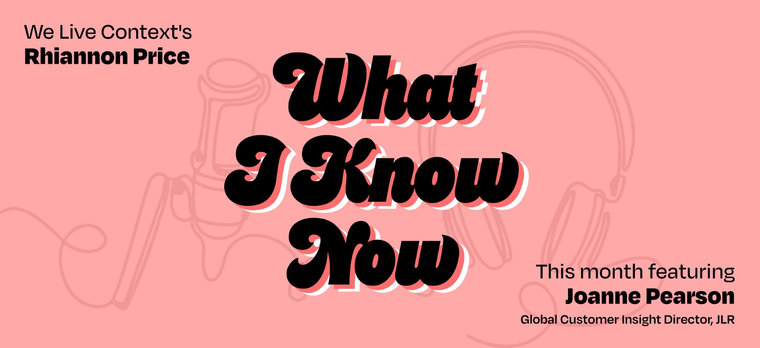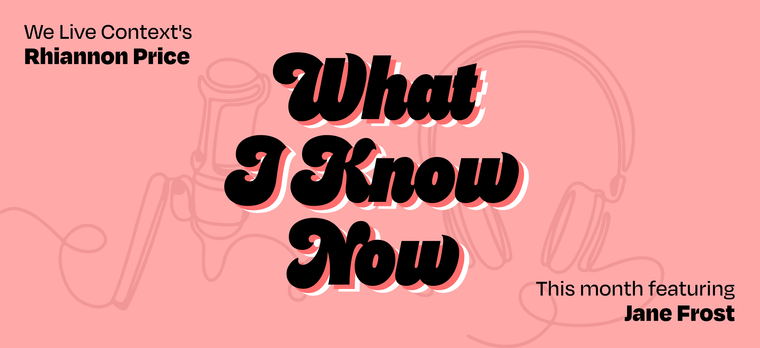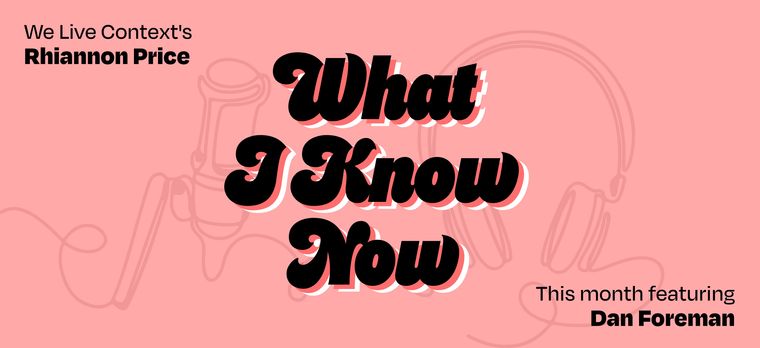What I Know Now... Kristin Luck
Each month, We Live Context’s Rhiannon Price asks some familiar faces in the MRX world what they have learned about themselves and the industry on their journey so far.
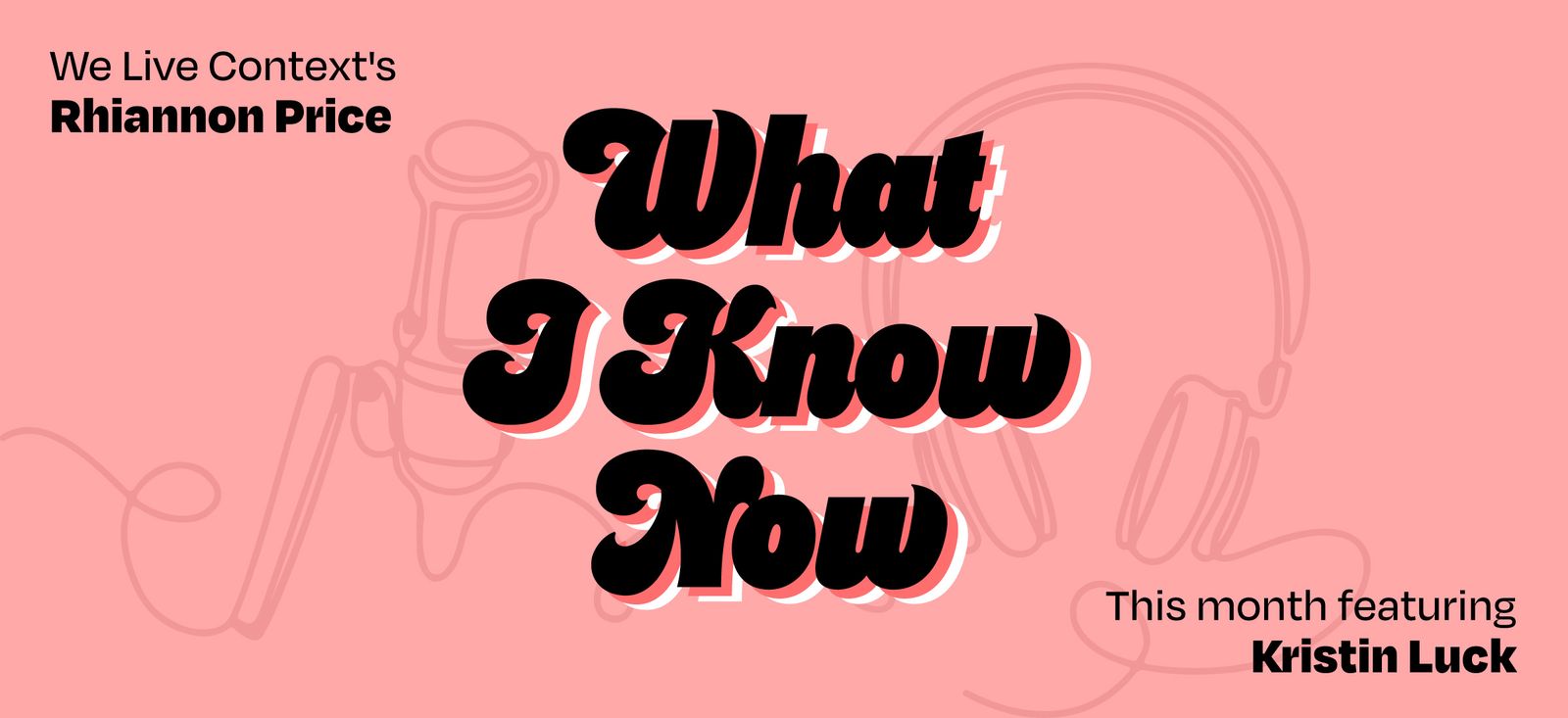
I’m lucky enough to have interviewed some super interesting people throughout my career. People from all over the world. People from all types of professions. People from many different backgrounds. I’ve spent days in their company taking it all in. I’ve seen them laugh, cry, and get angry about the twists and turns their path has taken them on. Be it a South African entrepreneur in Soweto or a Saudi millionaire, I have learned a lot about how people get to where they are going and their advice for life. But until recently, I have never really turned the lens inward. I have never asked my peers or the people I most admire in market research what their advice for life is. How they got to where they are. How they see things. But when I did, I found it wonderfully inspiring and not only a little bit transformative.
And so, I thought it was about time that we celebrated the wisdom of our MRX crowd and let their stories inspire us.
This month I spoke to Kristin Luck, former ESOMAR President, Founder of Women in Research, Growth Strategist, licensed Investment Banker and ‘serial entrepreneur’ who co-founded the fastest growing research firm in the world in 2002/2003. Kristin spoke to me about being nicknamed The Sweeper, ending up as an Investment Banker and how cocktails in LA turned into a 17,000 strong, global WIRe community.
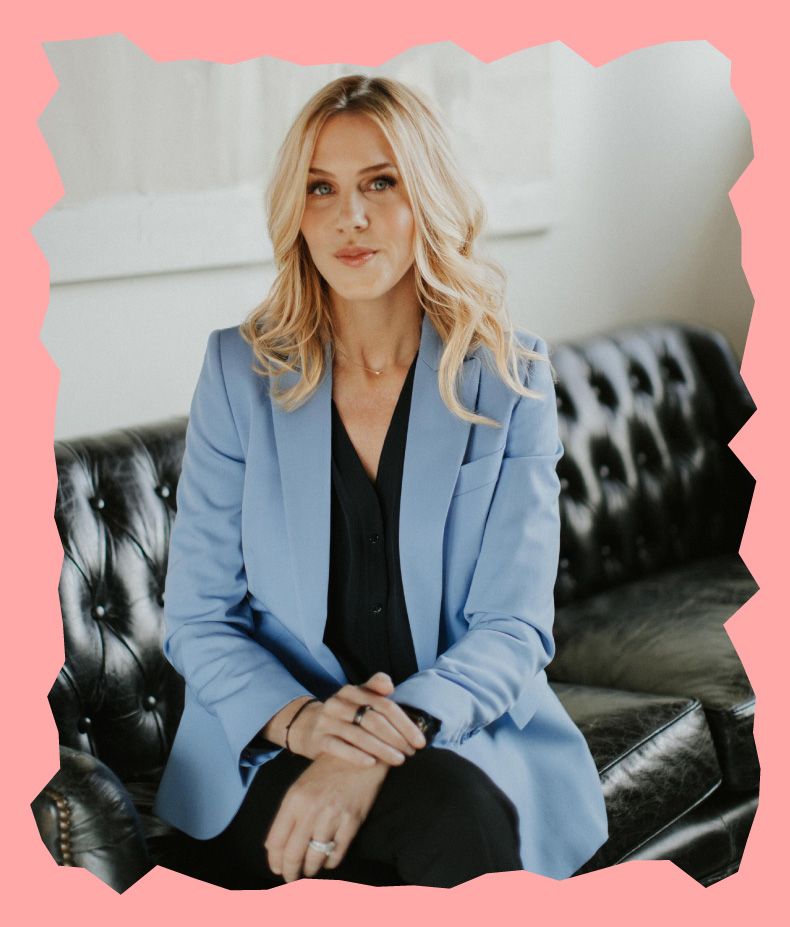
Let’s start like we mean to go on with the “big one at one”…Are you where you thought you would be at this point?
Does anybody ever say yes? No, I'm not even remotely where I thought I would be. And certainly if you’d told me even ten years ago that I would be an investment banker, I would have said you're crazy.
What was the pivot point? When did it all change?
I think my whole career has been a pivot point. There are lots of twists and turns that don't make a whole lot of sense to people looking at it from the outside. My whole career has been defined by what I find interesting at that moment in time.
For example, when I started out in full-service research, I got super interested in online research. The company I was at wasn't intending to go into that space, so I moved companies to pursue that. Then I ended up realising I could build something much better and faster if I started my own company which was gutsy because I grew up in a very small farming community in rural Oregon and I didn't know anybody that had started their own company before, let alone a woman.
That takes a huge deal of confidence and bravery anyway, let alone when you can't see any role models doing the same thing. What was driving you to do that?
Well, general naivete and stupidity! Yes, for sure it takes confidence, but also, I'm not that risk adverse. Whatever path I’ve taken I’ve been 100% confident I can make it work. And I know I'm going to outwork everybody. But also, I think part of it was being younger and not knowing what I was getting myself into. I was 29 or 30 when I started my first company and I just figured if it didn't work, what's the worst that's going to happen?
Tell me about the desire to go into online research and the fact your agency wasn’t interested in pursuing that.
I think a lot of it was frustration on my part. I was working at Lieberman Research Worldwide in Los Angeles, which is now Material Plus. It was my first job, and I had heard that online research was coming. Back then was almost pre-Internet days, I mean, I did have a computer but I remember they gave me a Mac classic on my first day of work and it took 15 minutes to boot up. I remember thinking, “what am I going do with this?!”. It was when we were all still fielding paper questionnaires in the mall and people were faxing everything! I knew that online was coming and there was an opportunity, so I ended up very overconfidently - as a 20 something is - marching into the CEO’s office, saying “Dave (Sackman), I think the whole industry is going to go online and I want to be part of that and I want to take Lieberman into the online space.” And he said “yeah, we're not going to go online.” He and I still laugh about that conversation! He said if that was something I was really passionate about, then I should probably find another place to go.
So maybe three or four months later I got a job at Nielsen to build out their first online research platform. I still have no idea how I landed that job having never built an online research platform, nor knowing anything about online research!
So looking back on that now, you said naivety, stupidity and over confidence probably played a role, but is there anything else that you think contributed?
I do think one of my super powers is that I can figure almost anything out. At Lieberman they would call me The Sweeper, as they’d give me the tough projects they were having problems with. If something's not working, I'm really going to dig in and figure it out.
So what drew you to market research in the first place?
I was the first person in my family to go to university. My parents couldn't afford to send me, so I worked my way through with a variety of odd jobs. Then in my junior year I ended up getting a job as a Research Assistant at a Social Science research firm and just really loved using data to tell a story. Then when I graduated I wanted to get out of Oregon so I flipped a coin between New York or LA, and it came up LA. I bought a copy of the LA Times and circled every job I thought would be a fit for me. And then I mailed my resume in because that's what we did back in those days.
You have gone on to be heavily involved in the industry at large, including being the President of ESOMAR and also the Founder of Women In Research. How did all that start?
I went to an ESOMAR event in the South of France and got exposed to a lot of folks that I would never have met otherwise. For me ESOMAR has been extremely critical to having a global career. I actually now live part time in Athens, Greece, which is kind of funny because the second ESOMAR Congress I ever went to was in Athens, and now my house sits right under the Acropolis!
I got involved at the board level primarily because I got asked to run for election as they weren't getting enough people run for Council, particularly younger people.
And were there many women that preceded you in that role?
I think I was only the second or third woman to be President and we are coming up on our 80th anniversary.
Wow. And I guess that segues nicely into Women in Research, I’m so fascinated to know how that all started as it's such a brilliant initiative.
I wish I could tell you there was some grand plan behind it, but honestly, I started it because I was living in LA at the time and there was a woman that had moved from San Franciso. She was really senior at MarketCast and she emailed me saying she didn’t really know any women in LA. And I said “oh, I know tons of women here in the research industry, I'll just email everyone I know, and we'll meet for cocktails”. We met in Beverly Hills at this little cocktail bar, and I think there were forty or fifty women that showed up. We had such a good time that we decided to do it every quarter. And it got bigger and bigger and bigger. We were getting over 100 women coming out for these things.
Then one of the women - Cassandra Rowe - moved to New York, so we started hosting events in New York. Then she moved to London, so we started doing them in London. At this point I was still flying around hosting every event. And then she went to San Francisco! That is when I realised I needed more help to run these events and that we needed to be more prescriptive about its vision - like, is it going to be something or is it just a cocktail hour? And more importantly, how can we be of real service to women in this industry? There are a lot of women's groups out there, but a lot of them are focused on women that are already in executive positions, and I think one of our bigger issues in this industry is that we don't have a strong pipeline for women, nor is there a really good understanding of what it takes to get into executive roles.
So, our vision for WIRe is how to create this pipeline and make sure that women have the resources and the connections in order to get to that next level.
It's a huge, huge job isn't it, to turn the ship around?
It is, yeah. It's funny because along the way there have been all these other organisations that popped up. They felt threatening at first because they were taking sponsorship dollars away from WIRe. But most people don't have the staying power. This is where grit comes into play again, and I don’t think people understand how long and how much effort it takes to build a community. We've now got 17,000 women involved in our programme globally.
It sounds like you've got some wonderful people around you as well that help you.
I mean, I don't run the day-to-day of WIRe anymore. Michelle Andre and Jessica Sage run the day-to-day and then we have a big network of volunteers around the world that run all of our local events and that was a really hard thing for me to let go of at first because I'm such a control freak. But I had to realize that if I ever wanted it to grow, I really have to let go of most things. Not everyone is going to run an event or send out a message or an email or whatever in exactly the way that I would, but that doesn't mean it's not good enough.
It's interesting talking to people about their relationship with failure. Do you embrace failure?
When you look at my LinkedIn profile it looks like it's just smooth sailing. Like so much success. But no one sees all the screw ups behind it and all the very hard lessons I had to learn. I think we all try to avoid failure, but it's inevitable.
Going back to being a women in research and business, have you noticed specific challenges linked to being a woman in business?
Sure. I mean misogyny is alive and well in this industry. You know, honestly, I faced a lot of it when I took the President role at ESOMAR. I had a lot of misogynistic feedback just in the first couple of weeks I was in office.
What did you learn from your time as President?
It was a hard term. I'm a really capable person and I think a lot of people would have struggled to get through a lot of the decisions we had to make. Also, ESOMAR is a non-profit association so the Council and Presidency are unpaid. But I would have people say “oh yeah, it's stressful, but you know, Kristin gets paid the big bucks for dealing with stuff like this”. But I wasn’t getting a dime. I was immensely criticised for the work I was doing, sometimes in public forums by people I had known my entire career. That was really hard for me.
So, just going back to your career journey. You have since pivoted into investment banking, where did that come from? That’s quite a big pivot!
Yeah, it's a big pivot. This goes back to what I mentioned at the beginning. I feel like a lot of people look at my career path and it doesn't make a whole lot of sense. But I really believe in this idea of having a portfolio career, which is unlike our parents who went into one job for their entire lives. Now there's less employer loyalty and as a result, less employee loyalty. Part of a portfolio career is looking at opportunities, the possible direction you can go. After I sold my last company, which was in 2014, I started consulting, specifically around growth strategy. I realised it wasn't really the starting of companies that I love so much, it was the scaling and all the growth challenges that come with that. So, I have been doing that for over ten years now. But about seven years ago, I realised I was doing a lot of pre-M&A optimisation work with firms, getting them ready to sell. But once they were going into the M&A process, I had to excuse myself because I wasn't licensed. So, I got sponsored to take my investment banking exams. I would not recommend those exams! I’ve not felt that dumb in a really long time. I studied every night and every weekend for six months because I was determined to pass them the first time around. I didn’t have time to take them multiple times.
Is there a piece of advice that you would bottle or a sound bite that you live by?
“Let go to grow” is really important. Another piece of advice I got was “don't let perfect get in the way of good enough”, because I'm a perfectionist and like everything to be just the right way. But I've learned to let go of that for things to grow and take their own shape.
The other really good piece of advice I received was from a psychotherapist I was talking to at a cocktail party in Manhattan. I suffer from massive anxiety and he told me that action brings relief. So, when you're stuck in a place where you don't know what to do and you're getting more and more anxious about it, the best thing you can do is just make a decision. We spend so much time obsessing about whether we’re making the wrong decision, but the truth of the matter is we don't know what the path for that other decision would have been like.
Another helpful thing when I get in one of these ‘this could go wrong’ doom spirals is try to spend an equal amount of time thinking about all the things that could go right in the situation. A Happy Spiral!
And finally, to end the conversation, some quick fire recommendations.
If you read just one book?
You should read Essentialism, by Greg McEwan. If you're like me and you're constantly overextended and saying yes to everything, you will not do that after reading this book. It’s about realising a lot of the things we say yes to are things that feed our ego, that make us feel more important or more involved with things, but the truth of the matter is that everything you say yes to is a no to something else.
If you listen to just one podcast?
I really love Freakonomics because it's all about different ways of thinking about things or problem solving, which I love.
If you follow just one person?
I follow Mark Ritson because he's just an amazing marketer. I just love his whole approach to things and he's really saucy and controversial.
And if you remember just one thing?
“You don't get what you deserve. You get what you ask for.”
